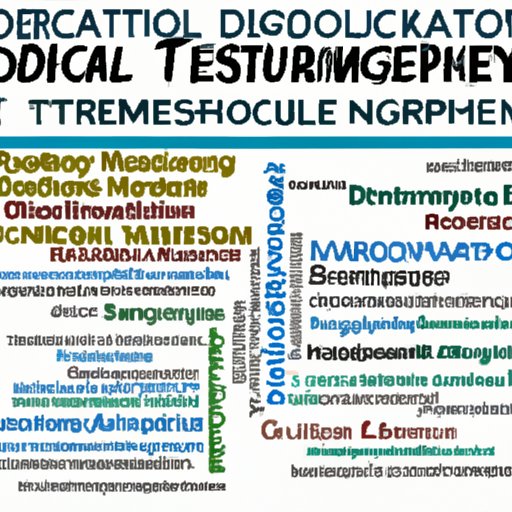Overview of Medical Technology Degree Programs
Medical technology is a field of study that focuses on the diagnosis and treatment of diseases and illnesses through the use of advanced medical equipment, laboratory tests, and other scientific methods. Professionals in this field are often referred to as medical technologists or medical technicians. In order to become qualified in this field, individuals must complete a degree program in medical technology.
Medical technology degree programs are offered at both the undergraduate and graduate levels. Undergraduate programs typically involve taking courses in biology, chemistry, mathematics, and physics, as well as specialized courses in medical technology. Graduate programs typically require more advanced coursework, such as genetics, immunology, and virology.
Students in medical technology degree programs will also gain hands-on experience in the lab setting. This type of training may include learning how to operate different types of medical equipment, preparing samples for analysis, and performing tests on patients. Students will also be taught about safety protocols and regulations related to working in a lab setting.
What Skills Can You Learn in a Medical Technology Program?
In a medical technology degree program, students will learn a variety of skills that can be applied in different medical settings. These skills include the ability to interpret data, understand laboratory techniques, and identify trends in results. Students will also learn how to use various types of medical equipment and how to prepare samples for testing.
In addition, students will learn how to analyze and interpret test results in order to diagnose and treat diseases and illnesses. They will also learn how to communicate effectively with other healthcare professionals, as well as how to maintain accurate records and follow safety protocols.
These skills can be applied in a variety of settings, including hospitals, clinics, research laboratories, and physician’s offices. With these skills, medical technologists and technicians are able to help diagnose, monitor, and treat a wide range of diseases and illnesses.
Career Options with a Medical Technology Degree
With a medical technology degree, there are many possible career paths available. These include working as a medical technologist, medical laboratory technician, medical laboratory assistant, and clinical laboratory scientist. Each of these positions requires different skills and knowledge, but all involve working with medical equipment and analyzing test results.
Medical technologists are responsible for operating and monitoring medical equipment, analyzing patient samples, and reporting results to physicians. Medical laboratory technicians assist medical technologists in collecting and processing specimens for analysis. Medical laboratory assistants perform basic laboratory tasks, such as labeling and filing samples, as well as assisting with specimen collection. Clinical laboratory scientists are responsible for conducting tests and analyzing results in order to diagnose and treat diseases and illnesses.
These positions typically require a bachelor’s degree in medical technology, although some may require additional certification or licensure. Additionally, some positions may require experience in a clinical setting.

Benefits of Pursuing a Medical Technology Degree
A medical technology degree can provide students with a number of advantages. First, having a degree in this field can increase job prospects, as employers are often looking for candidates with an educational background in medical technology. Additionally, those who pursue a degree in this field can specialize in certain areas, such as genetics or immunology, which can make them more attractive to potential employers.
Having a degree in medical technology can also open up opportunities for advancement in the field. For example, those with a degree may be eligible for positions as managers or supervisors in healthcare settings. Furthermore, having a degree can provide individuals with the knowledge and skills needed to pursue other opportunities, such as teaching or consulting.

Steps to Earn a Medical Technology Degree
The first step towards earning a medical technology degree is to meet the prerequisites for admission. Generally, this includes completing high school or equivalent, submitting transcripts, and providing letters of recommendation. Once accepted into the program, students will need to complete the required coursework and laboratory training.
Coursework typically involves classes in anatomy, physiology, microbiology, biochemistry, and other related topics. Students will also receive instruction in medical terminology, laboratory procedures, and ethics. Additionally, they may take courses in medical instrumentation, medical imaging, and medical informatics.
Finally, students will need to complete an internship or practicum in a medical setting. This allows them to apply their classroom knowledge to real-world situations and gain valuable experience.

Cost and Time to Complete a Medical Technology Degree
The cost of a medical technology degree program can vary depending on the institution and the length of the program. Generally speaking, a four-year bachelor’s degree program can cost anywhere from $20,000 to $50,000. Graduate degree programs can cost even more.
The amount of time it takes to complete a medical technology degree program can also vary. Most bachelor’s degree programs take four years to complete, while some may take longer. Graduate degree programs typically take two to three years to complete.
Factors that can impact the cost and time to complete a medical technology degree include the type of institution, the number of credits required, and the availability of financial aid.
Specializations Available in a Medical Technology Degree Program
Many medical technology degree programs offer specializations in specific areas, such as genetics, immunology, and biotechnology. Specializing in one of these areas can provide students with a deeper understanding of the field and an opportunity to focus on a particular area of interest.
Coursework for a specialization typically includes classes in the chosen area of study, as well as related topics. For example, those specializing in genetics may take courses in molecular biology and genetic engineering. Those specializing in immunology may take courses in immunology, pathology, and epidemiology.
Completing a specialization can provide students with a competitive edge when applying for jobs in the field. It can also give them a better understanding of how to apply their skills in different medical settings.
Conclusion
A medical technology degree provides students with the knowledge and skills necessary to work in a variety of healthcare settings. Through this degree program, students can learn how to operate medical equipment, interpret data, and diagnose and treat diseases and illnesses. There are also many career paths available to those with a medical technology degree, ranging from medical technologist to clinical laboratory scientist. Pursuing a medical technology degree can also provide students with the opportunity to specialize in a certain area, as well as the chance to advance in their careers.
(Note: Is this article not meeting your expectations? Do you have knowledge or insights to share? Unlock new opportunities and expand your reach by joining our authors team. Click Registration to join us and share your expertise with our readers.)
